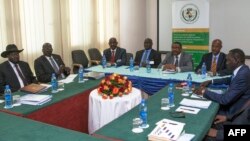On-again, off-again negotiations to bring peace to South Sudan have resumed with a face-to-face meeting between President Salva Kiir and rebel leader Riek Machar. With a deadline looming to reach a final peace deal, the two men are expected to negotiate major issues that have complicated previous discussions. Though an agreement on the structure and mandate of a transitional government was signed in early February, details regarding power-sharing, governance and security arrangements have proved elusive.
U.S. Secretary of State John Kerry has reached out to the warring parties and strongly urged them to seize the current and final round of negotiations to deliver a sustainable peace. We are well past the point where enough is enough, he said. Leaders must put the interests of their people above their own. The violence must end. A negotiated conclusion to this conflict is required now.
Legitimacy is not a presumed right of any government. It is conferred by the people, and it is sustained only by demonstrating leadership to protect and serve all citizens. These are responsibilities the government has neglected. The opposition has likewise failed to choose peace or make the hard choices required of leaders. Both President Kiir and Riek Machar have promised time and again that they would negotiate a transitional government, but have failed to make the compromises needed. The world is watching to see what the leaders of South Sudan now will do.
The United States will work with our international partners, including in the region, the UN Security Council, and beyond, to take further concerted action against those who do not demonstrate a willingness to make the difficult decisions needed for peace. Leaders can choose to do the hard work of implementing peace or they can all too easily drift back into the nightmare of war. The choice is clear, and for the sake of all the people of South Sudan, they must choose peace.






